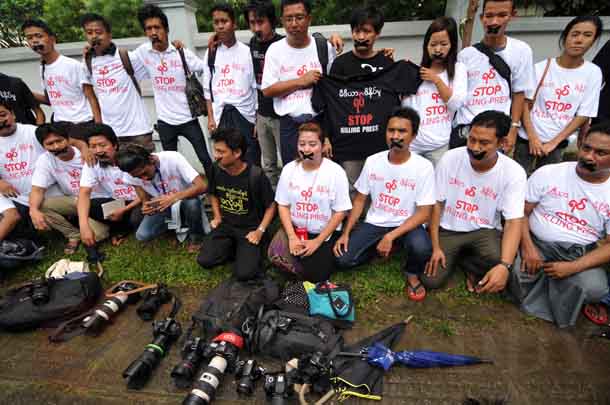A Return to the Bad Old Days for Freedom of Expression
By Burma Partnership • July 15, 2014 In a scarcely believable and punishingly harsh act of repression, four journalists and the CEO of Unity journal were sentenced by a Magwe Region court on 10 July to ten years imprisonment with hard labor for reporting on a story on a chemical weapons factory, giving a damming indictment of press freedom in Burma today. This occurred just days after President Thein Sein described Burma as “one of the freest in Southeast Asia” due to media reforms.
In a scarcely believable and punishingly harsh act of repression, four journalists and the CEO of Unity journal were sentenced by a Magwe Region court on 10 July to ten years imprisonment with hard labor for reporting on a story on a chemical weapons factory, giving a damming indictment of press freedom in Burma today. This occurred just days after President Thein Sein described Burma as “one of the freest in Southeast Asia” due to media reforms.
In January 2014, Unity journal published an investigative report on a chemical weapons factory in Magwe Region, central Burma, with accounts from factory workers, local villagers and photos of the site. While the Burma government eventually admitted it is a ‘standard ordnance factory’ that produces ordinary military equipment, an analysis of the images by the Center for Nonproliferation Studies concludes that there is strong evidence that this isn’t just a normal arms factory, and is consistent with chemical weapons factories in other places, such as North Korea. It is ironic that the journalists who published a story on chemical weapons are jailed for ten years under the State Secrets Act, while the Burma government denies it is making chemical weapons. Related to this, a point that has been overlooked slightly over the past week is that Burma must implement the measures of the Chemical Weapons Convention that it signed in 1993 and thus clear up the issue of whether Burma does have the capability to manufacture such equipment, as the Unity journalists reported and are now in prison for.
Yet the authorities did not want this information made public, and the four journalists and the CEO of Unity involved in the investigation, were arrested under the colonial-era State Secrets Act shortly after. The charges themselves were filed by President Thein Sein’s office and the sentence was handed down nearly six months later. Unsurprisingly, this caused a backlash, both domestically and internationally. A protest was held a day later outside the Myanmar Peace Center where inside President Thein Sein was meeting celebrities from Burma’s arts world. Around two dozen journalists attempted to cover the event wearing t-shirts, with the slogan, ‘Stop Killing Press,’ but were refused entry. Subsequently they taped their mouths and staged a silent demonstration outside the center. Internationally, rights groups have strongly denounced the sentences, with Reporters Without Borders calling it a “U-turn on freedom of information,” while Amnesty International described it as “a dark day for freedom of expression.”
This is not, however, out of line with recent government actions with the media. It is more an extension of an increasingly repressive media environment since initial media reforms in 2012. In June, military intelligence, Special Branch officers, in an act of intimidation, visited the offices of former exiled media outlet, The Irrawaddy to ostensibly to question their finances. After recent religious violence in Mandalay, President Thein Sein voiced a stark warning to the media; “Affirmative action will be taken against those who threaten state stability rather than using media freedom for good.” Arrests of journalists have not been limited to those from Unity either. Journalists from Eleven Media, Democratic Voice of Burma have been arrested and spent time in prison on defamation and trespass charges the past few months, while a journalist from Mizzima was arrested, ironically, for staging a demonstration against the lack of media freedom. Also last week, editors of Rangoon-based Bi Mon Te Nay newspaper were detained for publishing a story about a political activist group that claimed it had formed an interim government.
Freedom of expression and increasing media freedom are one of the main areas that international community has praised the Thein Sein government for. It has now become obvious that that praise was premature and misplaced. How many other areas of reform are going to backslide before the international community will start to grasp the reality and realize that the narrative they have constructed does not reflect the realities in Burma today? The reforms are not irreversible and with so many pressing issues in Burma right now, including the religious violence, a stalled peace process, and a culture of impunity for human rights violations committed by state authorities, vigilance is needed. This is where a free press and freedom of expression are so important. Pressure needs to be applied to the authorities in Burma to roll back repressive legislation, to foster an environment for freedom of expression, and to protect journalists. With the upcoming 2015 election, as well as the by-election in late 2014 how free the media is will be a benchmark to measure how free and fair these elections are, and as such give legitimacy to those elected.
Tags: 2015 Elections, Amnesty International, Arrest, Burma Partnership, Chemical Weapons Convention, Freedom of Expression, Government of Myanmar, Imprisonment, Journalists, Media, President Thein Sein, Reporters Without BordersThis post is in: Blog
Related PostsArmed Forces and Democratization in Myanmar: Why the U.S. Military Should Engage the Tatmadaw
Burma: Country Reports on Human Rights Practices for 2015
Report of the Special Rapporteur on the situation of human rights in Myanmar
Atrocities Prevention Report: Targeting of and Attacks on Members of Religious Groups in Burma
The 2015 Elections and Beyond: Perspectives from villagers in rural southeast Burma/Myanmar









 All posts
All posts